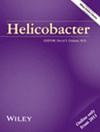Seven-Day Versus 14-Day Tegoprazan and Tetracycline-Containing Quadruple Therapy for First-Line Eradication of Helicobacter pylori Infection: A Randomized, Open-Label, Noninferiority Trial
Abstract
Background and Aims
Tegoprazan, a new class of drugs, is a potassium-competitive acid blocker (P-CAB) that inhibits gastric H+/K+-ATPase through a different mechanism than proton pump inhibitor. Tetracycline also has anti-Helicobacter pylori properties. However, only a few randomized controlled trials (RCTs) have investigated the efficacy of tegoprazan and tetracycline-containing quadruple therapy (TTQT) for treating H. pylori infections, which this RCT explored.
Methods
This multicenter RCT included treatment-naïve adults with H. pylori infection who received 7 or 14 days of TTQT (50-mg tegoprazan, 220-mg bismuth potassium citrate, and 1000-mg amoxicillin twice daily with 500-mg tetracycline four times daily). The primary outcome was the eradication rate; secondary endpoints included the incidence of adverse events, treatment compliance, and regimen costs.
Results
The study included 258 patients. The eradication rates in the 7- and 14-day groups were 90.70% (117/129, 95% confidence interval [CI]: 83.98%–94.89%) and 91.47% (118/129, 95% CI: 84.90%–95.45%), respectively, in the intention-to-treat analysis (difference: −0.78%; −7.01%–8.58%; noninferiority p < 0.001); 92.86% (117/126, 95% CI: 86.50%–96.48%) and 93.65% (118/126, 95% CI: 87.47%–97.02%), respectively, in the modified intention-to-treat analysis (difference: 0.79%; 95% CI: −6.36%–7.99%; noninferiority p < 0.001); and 94.35% (117/124, 95% CI: 88.29%–97.50%) and 95.12% (117/123, 95% CI: 89.24%–98.00%), respectively, in the per-protocol analysis (difference: −0.77%; 95% CI: −5.91%–7.48%; noninferiority p < 0.001). Significantly fewer adverse events occurred in the 7-day group than in the 14-day group (22.48% vs. 35.67%, p = 0.020). Treatment compliance did not differ between the two groups.
Conclusions
The 7- and 14-day TTQT efficacies for the first-line treatment of H. pylori infection were comparable, and fewer adverse effects occurred in the 7-day group. This trial has been registered at Clinical Trials.gov (NCT05997433).

 求助内容:
求助内容: 应助结果提醒方式:
应助结果提醒方式:


